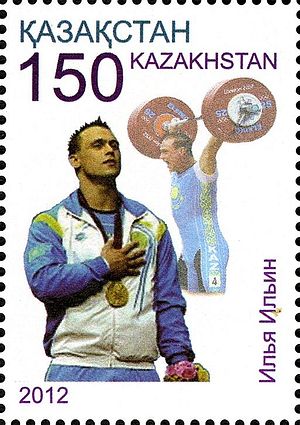Four Kazakh weightlifters have been provisionally suspended by the International Weightlifting Federation (IWF), the sport’s governing body, following reanalysis of samples from the 2012 London Olympic Games.
Reports earlier in June noted that Kazakhstan admitted that five athletes from the 2012 London Games and the 2008 Beijing Games had tested positive in the IOC’s retesting campaigning but at the time no names were released. The four now-named Kazakhs join a growing number of athletes from former Soviet countries who appear to have used performance-enhancing drugs while competing in the Olympic Games. In early June the IOC said 55 positive results had been recorded in the reanalysis campaign.
An in-depth report by the New York Times on the Russian doping scandal last November detailed the anti-doping and reanalysis procedures embedded in modern international sports:
At all major international athletic competitions, athletes are required to submit a urine sample for testing. The sample is divided into two bottles. One, the A bottle, is tested immediately; the other, the B bottle, is sealed and stored for up to 10 years, in case the athlete’s past performance is ever called into question.
Ilya Ilyin, one of Kazakhstan’s most famous athletes and a gold medalist at both London and Beijing, tested positive for two anabolic steroids, Dehydrochloromethyltestosterone and Stanozolol, in a sample provided for the London Games. Ilyin is Kazakhstan’s first two-time Olympic champion and holds two world records presently in the 94 kg class. Ilyin called the IWF’s announcement a “a thunderstorm on a sunny day” and denied the doping charges. “I think we will be able to prove the complete absurdity and inconsistency of the allegations against me,” he wrote on Instagram.
Zulfia Chinshanlo, Maia Maneza, and Svetlana Podobedova–all three gold medal winners at London and holders of world records–also tested positive for anabolic steroids in the IOC’s reanalysis of the London samples.
The other athletes named and suspended by the IWF in their June 15 announcement included medalists from Russia, Azerbaijan, Belarus, and Ukraine.
The former vice president of Kazakhstan’s National Olympic Committee, Pavel Novikov, was quoted by RFE/RL as dismissing the findings, and disparaging the World Anti-Doping Agency (WADA). WADA has led the charge in exposing the doping scandal, the findings of which have seemed to disproportionately land on former-Soviet shores. “For some reason, tests for banned drugs are only of interest for athletes who have represented and represent countries of the former Soviet Union… We see that there is a political push to discredit the major sporting achievements of former Soviet Union countries,” he said.
The IOC executive board noted in a statement regarding the unfolding doping scandals that “Special focus will be put on countries where the testing program is non-compliant – Kenya, Russia, and Mexico. A special focus will also be put on those sports which WADA has declared most affected.” Further, athletes targeted for reanalysis, the IOC says, are those who have won medals–with an eye toward suspending implicated athletes ahead of the Rio games.
While it looks likely that the four Kazakh athletes may be banned from the Rio Games, Russia is awaiting the IOC’s ruling on whether the suspension of its entire track and field team will be sustained through the Rio Games.
A particularly intriguing Reuters report details the politicking between several international sports bodies: the IOC, the International Association of Athletics Federations (IAAF), and WADA. In March the IAAF voted to maintain the ban on Russian participation in track and field competitions after a lack of progress following the November 2015 bombshell WADA report exposing state-sponsored doping in Russia. A report update released recently detailed that doping violations continue, including obstruction and intimidation of doping control officers.
Reuters reports that the IAAF is to vote Friday if the ban is being lifted, therefore allowing Russian athletes to compete in Rio. But the IOC says the decision on whether Russia can compete or not rests with them and a meeting in Lausanne on June 21. IOC President Thomas Bach declined to speculate, but as the Reuters report put it “Bach’s comments have sparked a rash of rumors, speculation and off-the-record whisperings”:
Bach has had a long and fruitful relationship with Russia and its president, Vladimir Putin, not least because of the huge investment the country made to put on the Sochi Winter Olympics in 2014.
“Putin has 50 billion reasons to expect a favor from the IOC,” one source told Reuters, referring the dollar cost of Sochi, and echoing the thoughts of many that the political pressure to include Russia would outweigh the benefit of a ban.

































